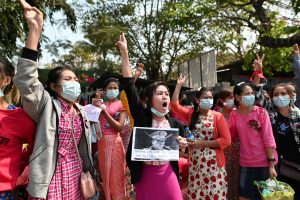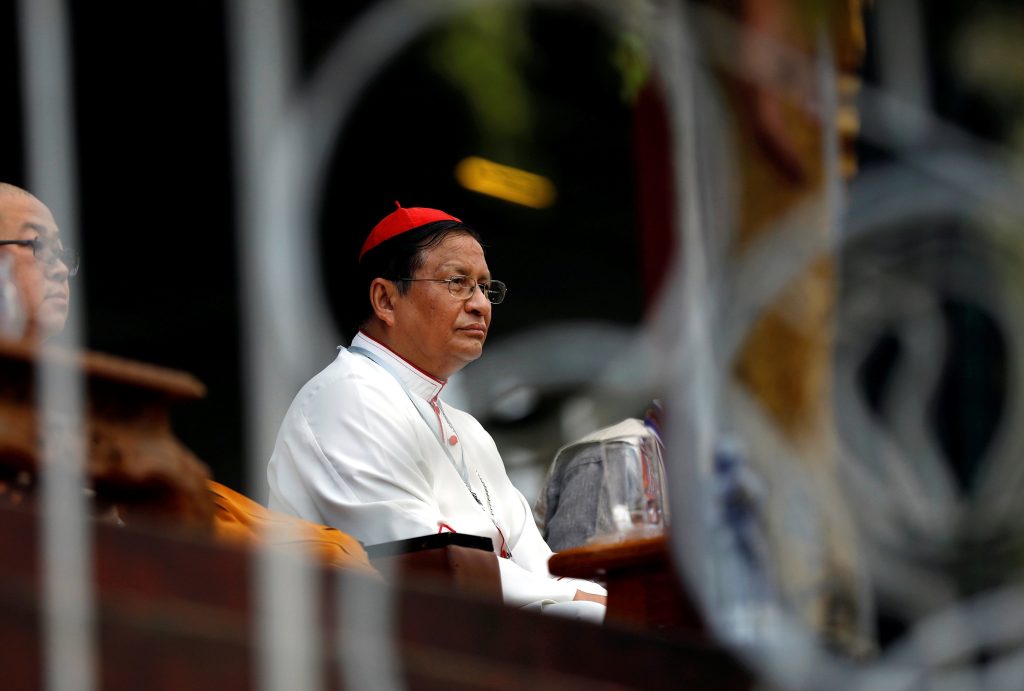ROME — Against long odds, it’s possible that one of the most important players in the ongoing drama in Myanmar may be a religious leader whose total following can be numbered in five digits, representing less than 1% of the national population: Roman Catholic Cardinal Charles Maung Bo.
A Salesian, Cardinal Bo presumably was especially pained that his country’s current coup d’état was launched the day after the feast of St. John Bosco, the legendary founder of his religious order. As part of the military takeover, civilian leaders, including Nobel laureate Aung San Suu Kyi, have been detained, and a state of emergency imposed.
While Myanmar’s military leaders insist they acted in defense of democracy, describing a November election that saw the military-backed party lose decisively as fraudulent, when and how a return to civilian rule may occur remains unclear.
Curiously enough, Cardinal Bo, who was made a cardinal by Pope Francis in 2015, has emerged in recent years as the public face and voice of religion in Myanmar, despite the fact that almost 90% of the population is Buddhist. All told, Christians make up about 6% of the population of 53.5 million people, with Catholics just 1% at roughly 75,000 followers.
Yet, as I’ve often said, if there’s one thing the outside world understands about the Catholic Church, it’s the difference between a cardinal and everybody else. Cardinals are universally perceived as big deals, so when Cardinal Bo speaks in Myanmar, he’s seen as doing so not just on behalf of 75,000 locals, but 1.3 billion Catholics worldwide, including the boss in Rome.
That’s enough to get the attention not only of the Burmese population, but also its military ruling class.
In effect, Cardinal Bo’s prominence, and the leverage it affords him in national affairs, is one concrete payoff from Pope Francis’ strategy of distributing red hats to the peripheries of the world, because it’s amplified the Church’s voice in a surprising number of places like Myanmar.
Especially since his designation as a cardinal, he is often called upon to present joint statements of religious leaders in Myanmar. Although it’s an overwhelmingly Buddhist society, no single Buddhist sage has the prominence or media platform of the 72-year-old cardinal, who was born into a farm family in south-central Myanmar (then known as Burma) in 1948.
Though spiritual leaders in Myanmar generally tread lightly in commentary on the military, Cardinal Bo has been outspokenly critical of the coup. In a Feb. 3 statement, just two days after the military seized power, he issued a statement saying the coup had “shocked the world and the people of Myanmar.” He also called for the release of the arrested political leaders, and he gave special praise to Suu Kyi.
Yet Cardinal Bo is no wide-eyed dreamer, meaning he understands there’s no plausible exit strategy from the coup that doesn’t involve preserving a significant role for the military in national affairs. In the same statement, he praised the army for its willingness to hand over power to a democratically elected government, and also indirectly criticized Suu Kyi for refusing to engage the military in dialogue over its concerns about the election results.

In a coda sure to win favor with the domestic population in Myanmar, Cardinal Bo also urged the international community not to impose sanctions on the country, saying such measures in the past had proved “a great blessing to those superpowers that eye our resources” — a not-so-subtle swipe at China, which already has an economic stranglehold on its smaller neighbor.
Speaking of China, one might wonder if the Vatican has any concerns about Cardinal Bo’s outspokenness, mostly for fear of fallout vis-à-vis its own delicate relationship with Beijing.
In reality, however, most observers believe China isn’t exactly thrilled with the coup, since its top priorities regarding Myanmar tend to be security along the 1,300 mile border the two nations share, as well as economic and political stability in order that its investments in the country will turn a tidy profit.
In other words, right now China may well be pleased to see Cardinal Bo pushing for a negotiated return to the status quo ante, freeing up the Vatican to back its man on the ground without worrying about impeding its desire for full diplomatic relations with Beijing.
Going forward, Cardinal Bo may be positioned to play a key role in brokering a deal. The military needs him to bestow some sort of moral legitimacy on their actions, and the country’s civilian leaders need him to cajole the generals into a strategic retreat.
If Cardinal Bo plays his cards right, he could go down as the religious leader who saved democracy in Myanmar. The long-term consequences of that are impossible to predict, though it’s worth noting that in another Asian nation, South Korea, the dramatic growth of Catholicism over the last couple of decades is credited in part to the role Church leaders there played in the democratization of the country after a long period of military rule.
For all sorts of reasons, therefore, both humanitarian and evangelical, many people inside Myanmar and out are currently hoping — in a phrase made famous by an advertising campaign around American athlete Bo Jackson — that “Bo Knows,” in this case meaning that he knows how to bring his troubled nation in for a safe landing.

